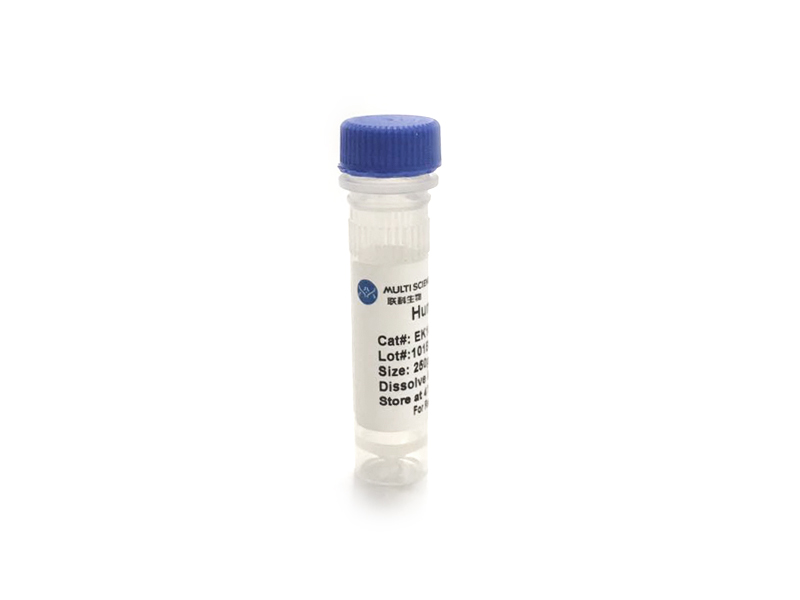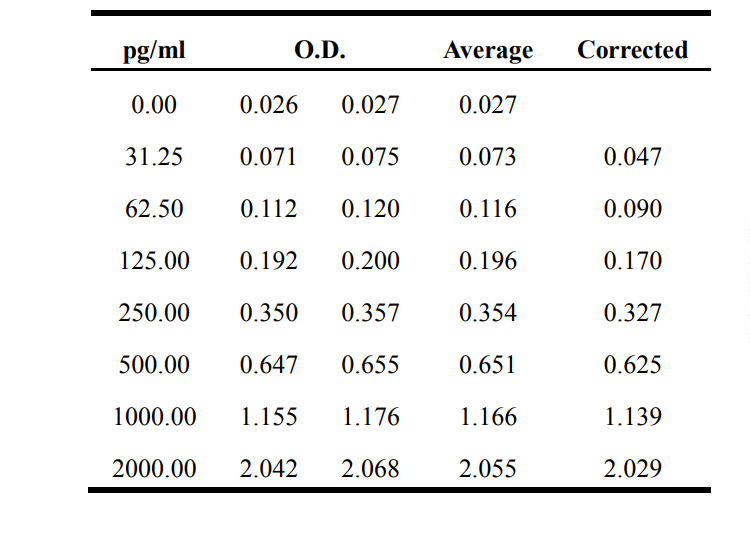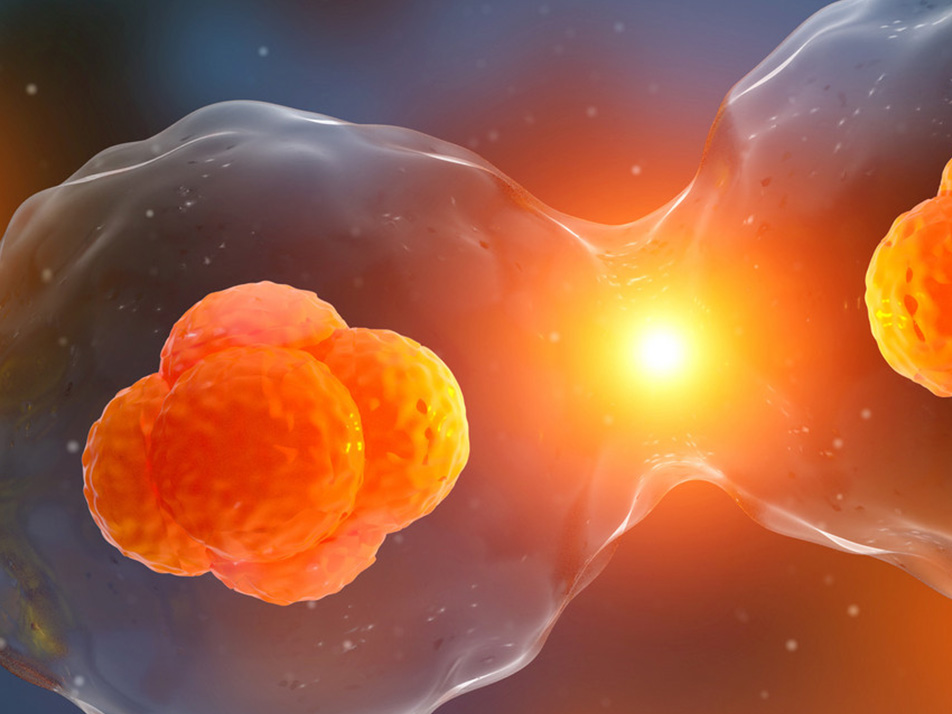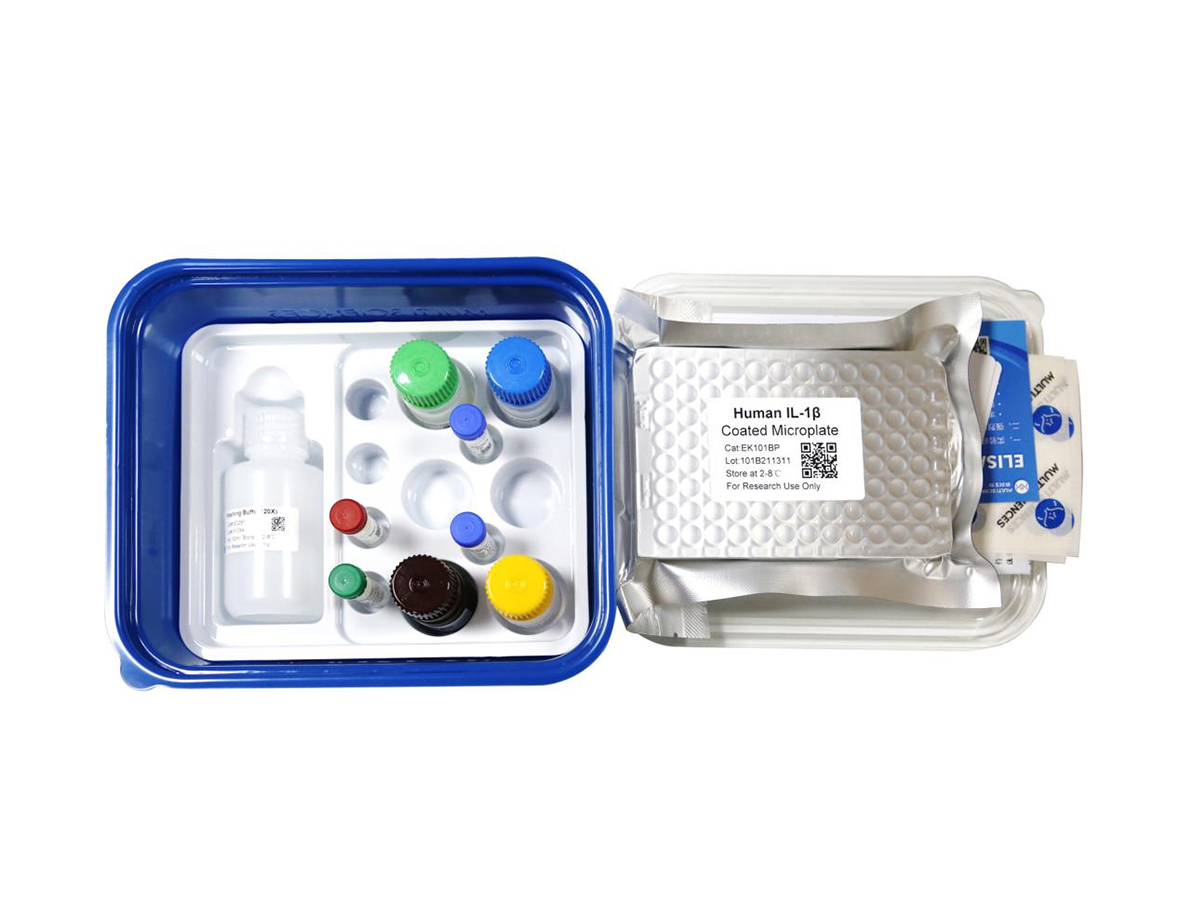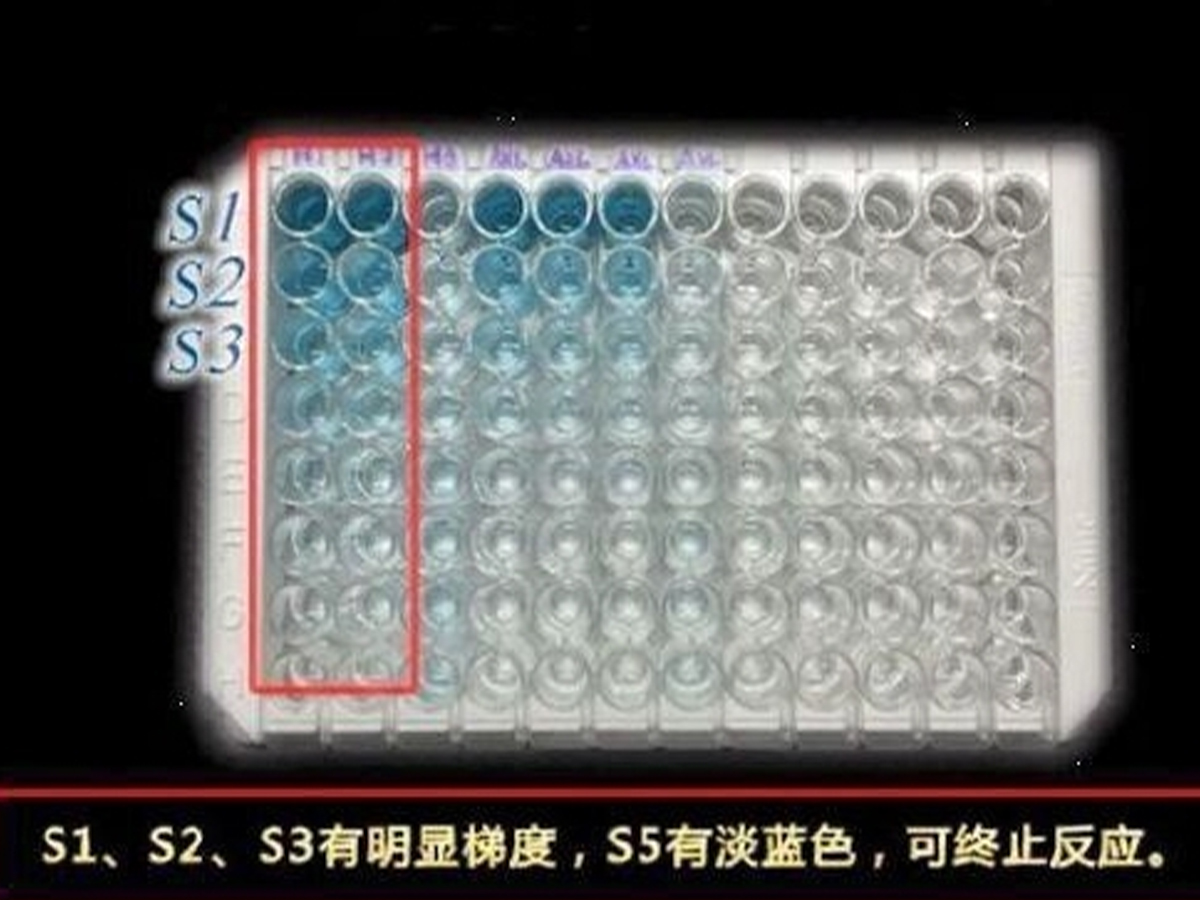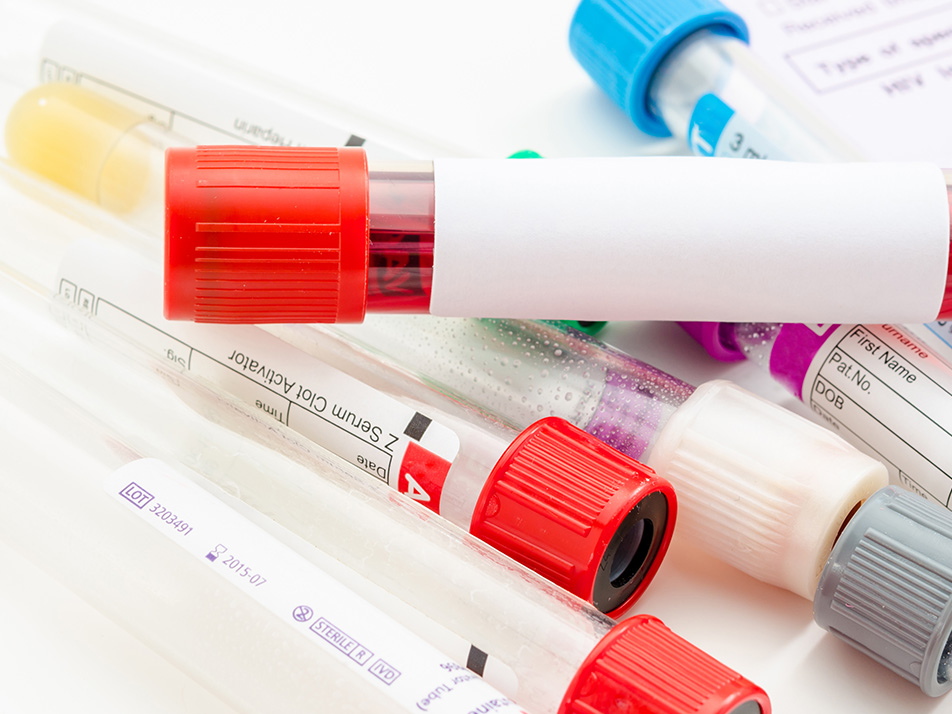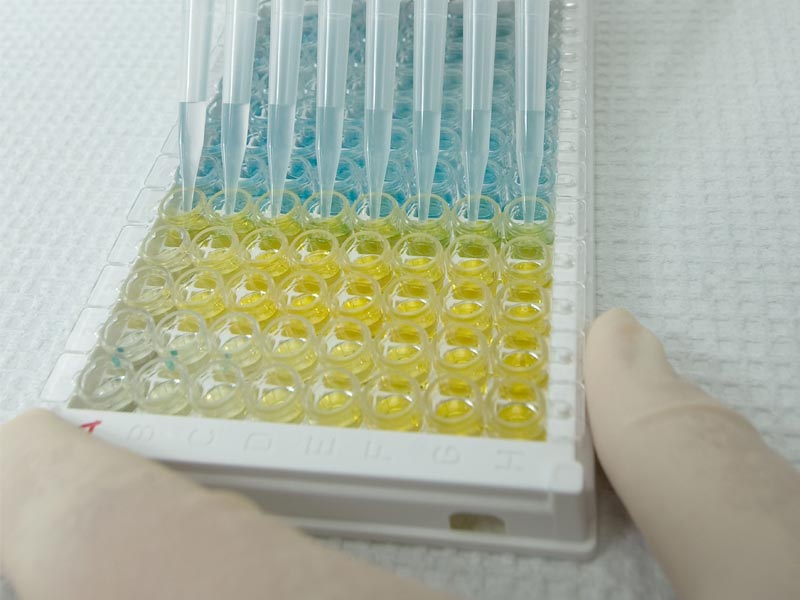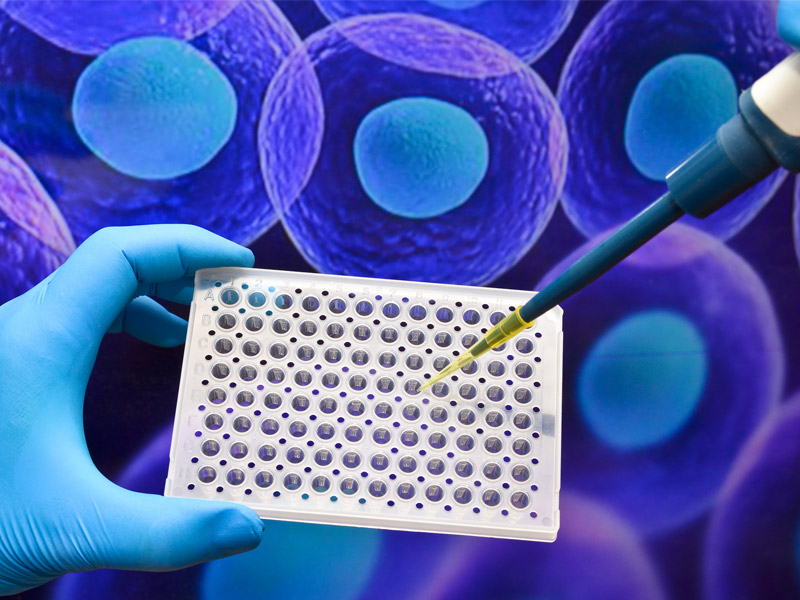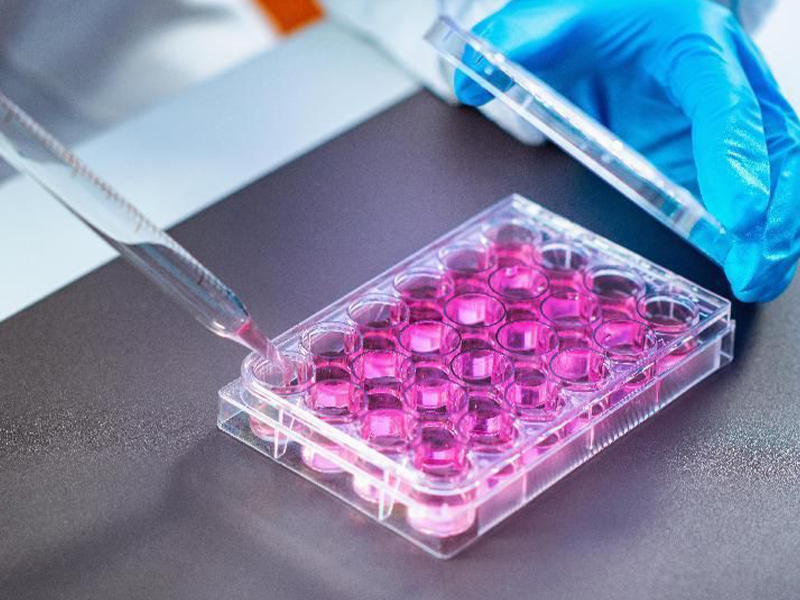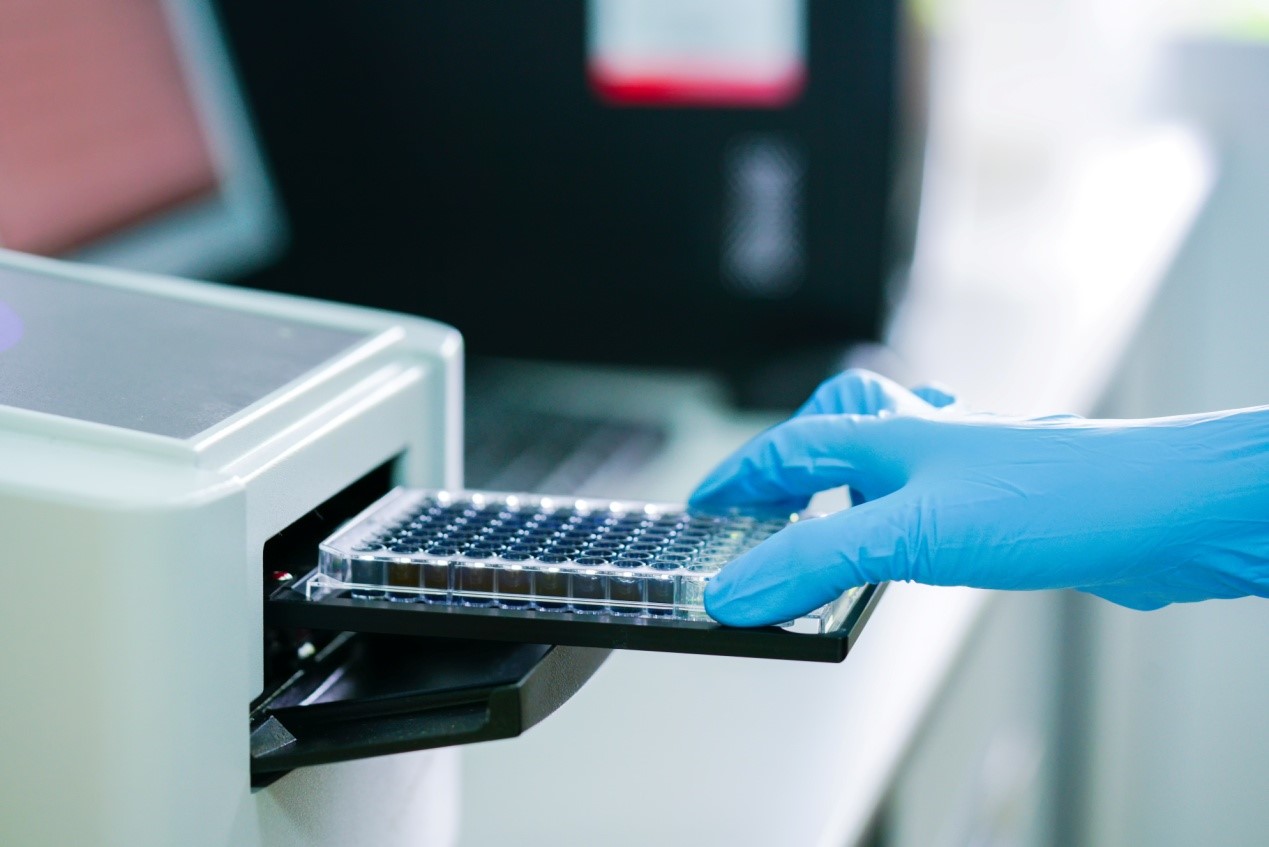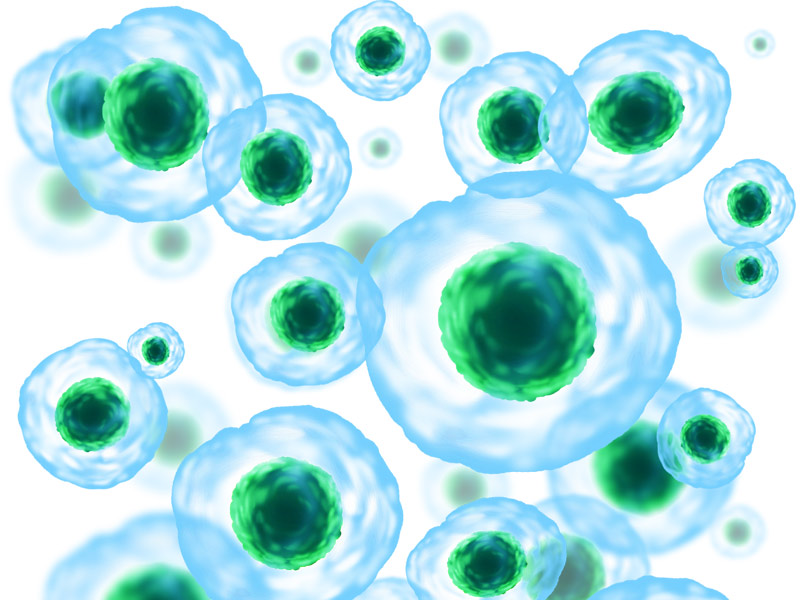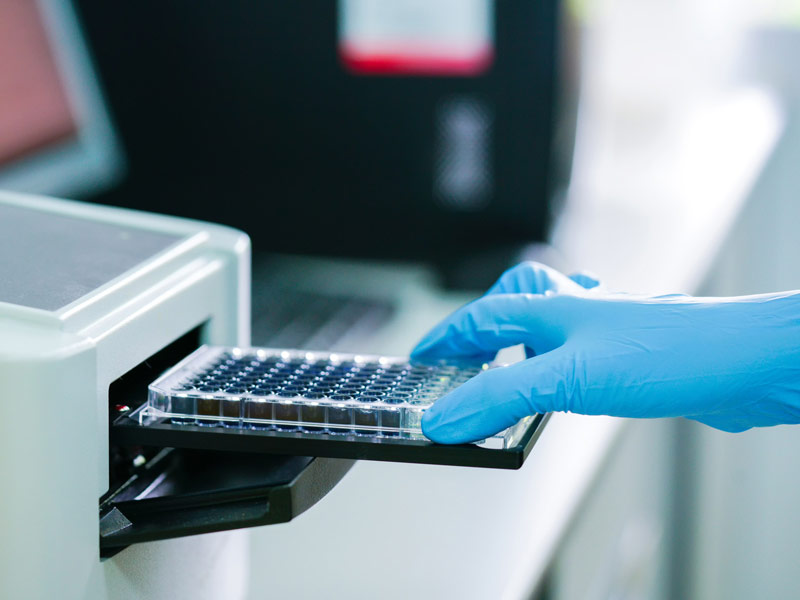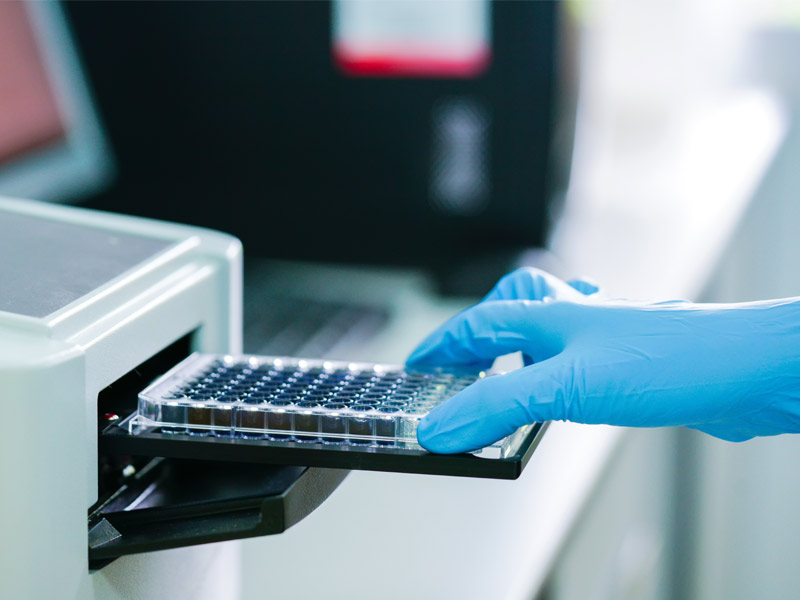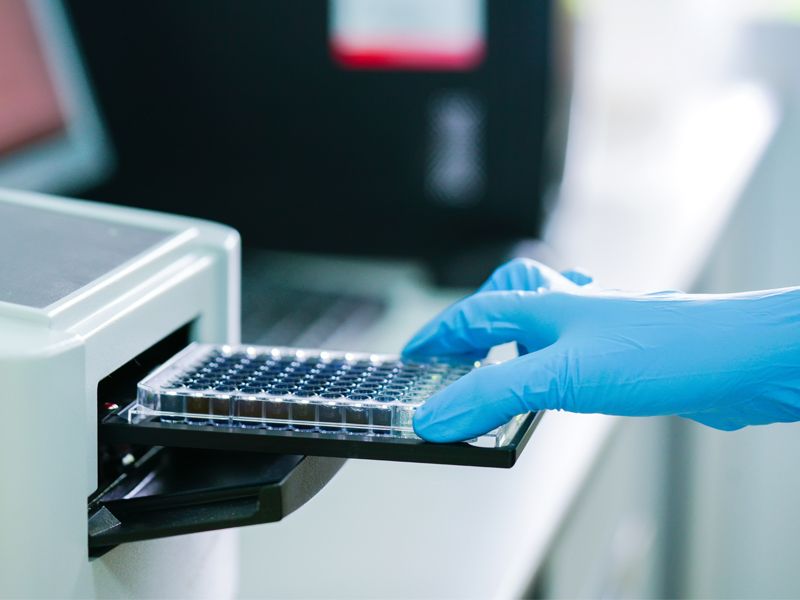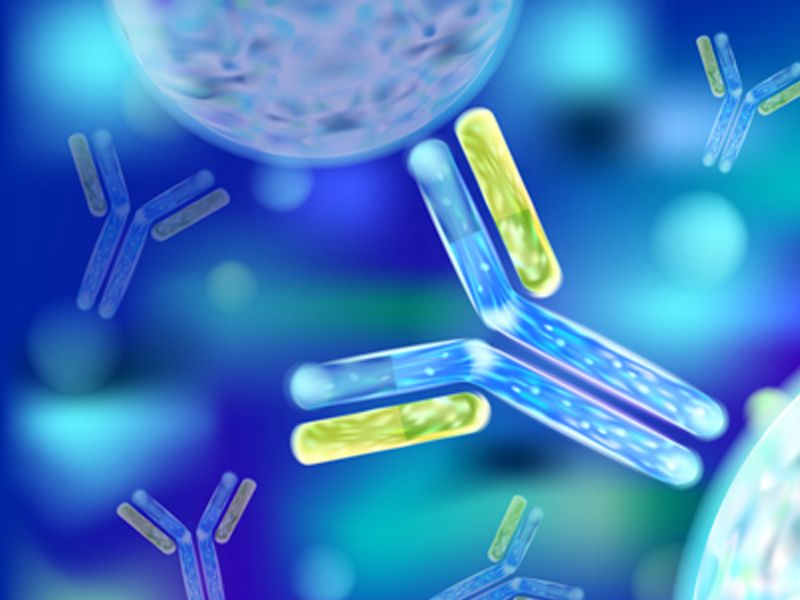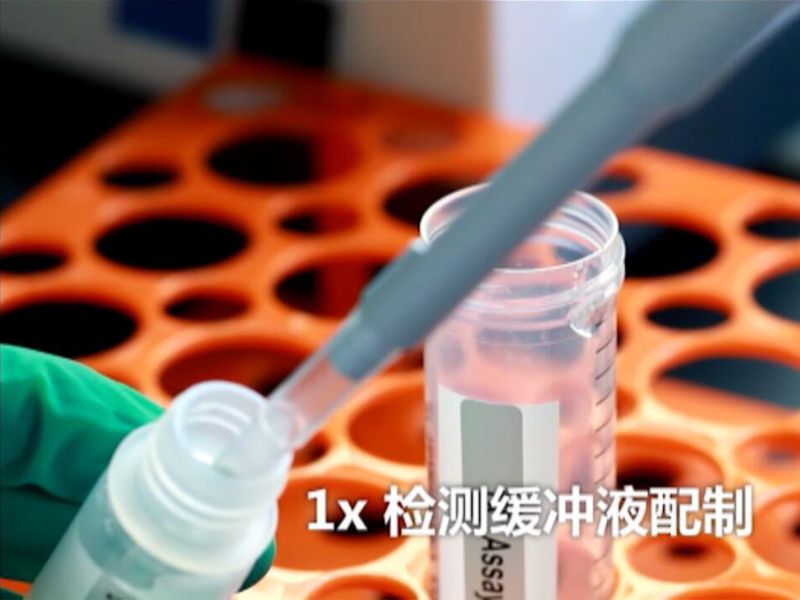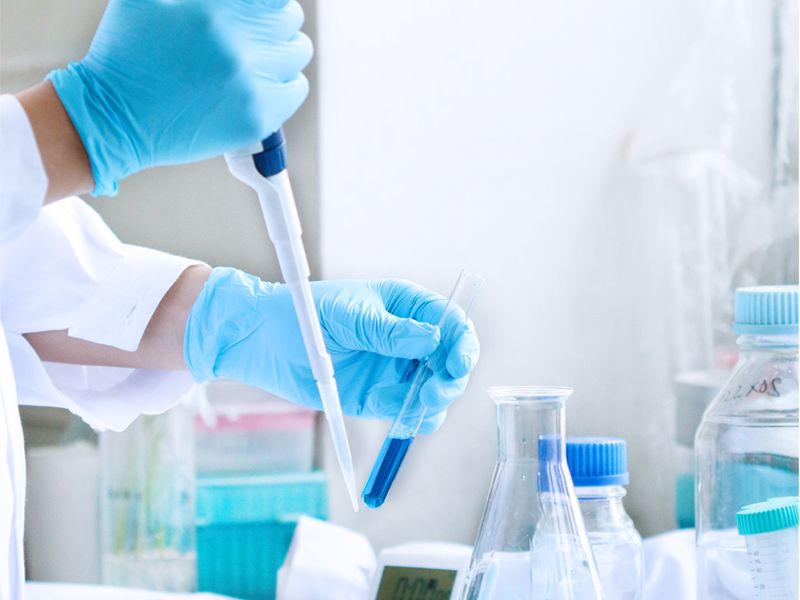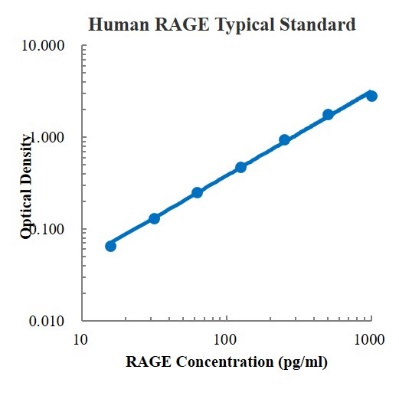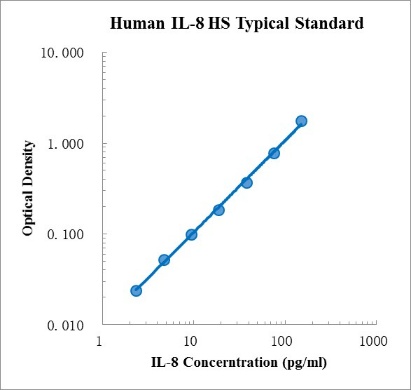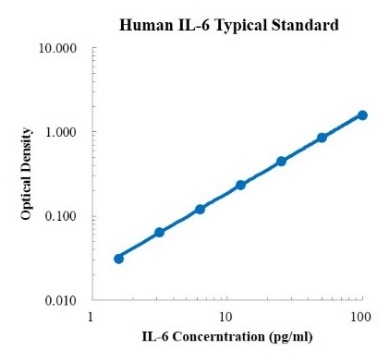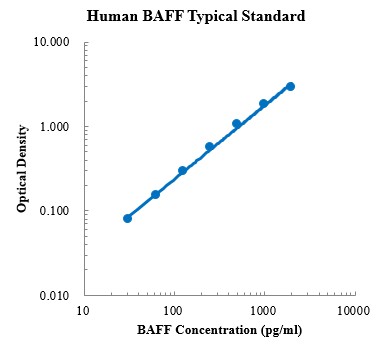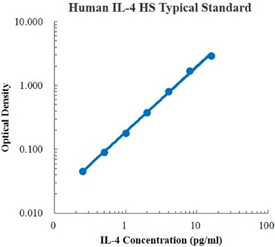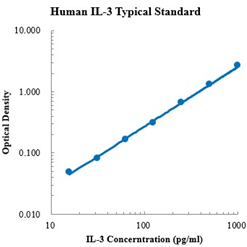Human VEGF Standard (人血管内皮生长因子 (VEGF) 标准品)
¥280.00
描述
文章目录[隐藏]
本产品只包含标准品试剂,如需购买试剂盒请点击下图
-
- EK183 96 Citations
- FEATURED ELISA KIT, ELISA试剂盒
Human VEGF ELISA Kit检测试剂盒(酶联免疫吸附法)
- ¥1,600.00 – ¥10,800.00
| 商品名 |
Human VEGF Standard (人血管内皮生长因子 (VEGF) 标准品) |
|---|---|
| 组分 |
人VEGF冻干标准品V |
| 检测方法 |
双抗夹心法 |
| 样本类型 |
血清,血浆,细胞培养上清及其他生物学样本 |
| 板式 |
管 |
| 保存 |
短期4℃,长期-20℃保存 |
| 运输条件 |
4℃蓝冰运输 |
检测原理:本试剂盒采用双抗体夹心酶联免疫吸附检测技术。特异性抗人VEGF抗体预包被在高亲和力的酶标板上。酶标板孔中加入标准品、待测样本和生物素化的检测抗体,经过孵育,样本中存在的VEGF与固相抗体和检测抗体结合。洗涤去除未结合的物质后,加入辣根过氧化物酶标记的链霉亲和素(Streptavidin-HRP)。洗涤后,加入显色底物TMB,避光显色。颜色反应的深浅与样本中VEGF的浓度成正比。加入终止液终止反应,在450 nm波长(参考波长570 - 630 nm)测定吸光度值。
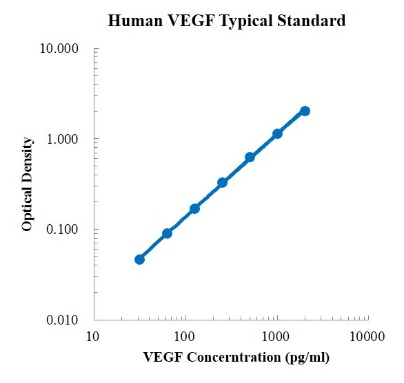
分子信息
VEGFA 分子靶点信息概述
- 分子名:VEGFA, vascular endothelial growth factor A
- 基因家族:VEGF family
- 别名:VEGF-A; VPF
- 曾用名:VEGF
- 全称:vascular endothelial growth factor
VEGFA 分子靶点综述
血管内皮生长因子(VEGF)是生长因子的亚家族,具体来说,属于胱氨酸结生长因子中的血小板衍生生长因子(PDGF)家族。它们是重要的信号转导蛋白,参与血管发生(胚胎循环系统从头形成)和血管生成(从已存在的脉管系统生长形成血管)。VEGF可刺激血管发生和血管生成。当血液循环不足时,可参与回复组织供氧系统。VEGF最主要的作用是血管生成。在胚胎形成期,VEGF调控内皮细胞的增殖、迁移和存活,从而调控血管密度和大小,但无法决定血管的类型。在支气管哮喘和糖尿病患者的血清中含有高浓度VEGF。当VEGF过表达时会引起疾病。供血不足时,实体肿瘤的大小受限;而表达VEGF的肿瘤则会不断生长并发生转移。VEGF过表达会导致眼睛视网膜和身体其他部分的血管性疾病。贝伐珠单抗和雷珠单抗可抑制VEGF,并控制或减缓疾病进程。
人 Human VEGFA 分子靶点信息
- 分子名:VEGFA, vascular endothelial growth factor A
- 别称:
- MGC70609
- MVCD1
- vascular endothelial growth factor
- vascular endothelial growth factor A121
- vascular endothelial growth factor A165
- vascular permeability factor
- VEGF
- VEGF-A
- VPF
- 基因序列:NCBI_Gene: 7422
- 蛋白序列:UniProtKB: P15692
人 Human VEGFA靶点分子功能(预测)
Enables several functions, including fibronectin binding activity; heparin binding activity; and signaling receptor binding activity. Involved in several processes, including positive regulation of cell migration; positive regulation of intracellular signal transduction; and positive regulation of macromolecule metabolic process. Acts upstream of or within several processes, including branching involved in blood vessel morphogenesis; positive regulation of endothelial cell proliferation; and regulation of nitric oxide mediated signal transduction. Located in several cellular components, including adherens junction; cell surface; and secretory granule. Implicated in several diseases, including autoimmune disease (multiple); gastrointestinal system cancer (multiple); hematologic cancer (multiple); hypertension (multiple); and reproductive organ cancer (multiple). Biomarker of several diseases, including artery disease (multiple); autoimmune disease (multiple); eye disease (multiple); inflammatory bowel disease (multiple); and respiratory system cancer (multiple).
引用文献统计
该产品被引用的文献总数为:1
- Regulatory Effect of Microrna-34a on Osteogenesis and Angiogenesis in Glucocorticoid-Induced Osteonecrosis of the Femoral Head
刊物:Journal of orthopaedic research : official publication of the Orthopaedic Research Society 36, 417-424 (2018)
ELISA标准品操作常见问题查看更多ELISA标准品操作步骤技术文章
查看更多ELISA标准品操作步骤技术文章
操作步骤
文章目录[隐藏]
- ELISA操作常见问题
- 小心!你的 ELISA 试剂盒可能是假的
- 开学学习计划,如何收集ELISA检测样本——细胞
- 开学学习计划,如何选择ELISA试剂盒
- 开学学习计划,ELISA从新手到入门!
- 一文掌握ELISA实验显色判断、数据分析及标曲拟合
- 血清OR血浆,哪个是ELISA的菜
- ELISA通关必备丨数据篇丨标准曲线不佳
- ELISA通关必备丨操作篇丨常见问题及解决方案
- ELISA通关必备丨操作篇丨溶解与稀释标准品
- ELISA通关必备丨样本篇丨不常见样本
- ELISA通关必备丨样本篇丨常见样本丨细胞
- ELISA通关必备丨如何选择试剂盒
- ELISA通关必备丨基础知识
- 真?假?ELISA试剂盒选择要小心
- ELISA常见类型一 | 双抗夹心法,你要的都在这里!
- ELISA常见类型二 | 竞争法,五分钟搞定!
- 叮!联科向您投递了个ELISA实验操作干货包,请查收~
- 【视频】ELISA实验操作步骤演示视频教程
- ELISA 组织样本的处理—大鼠组织
- 【视频】ELISA实验原理与常见问题分析
- 查看更多ELISA操作相关问题
ELISA操作常见问题
查看更多ELISA操作相关问题
引用文献
文章目录[隐藏]
- BRAFV600E mutant colorectal cancer cells mediate local immunosuppressive microenvironment through exosomal long noncoding RNAs
- The coupling of reduced type H vessels with unloading-induced bone loss and the protection role of Panax quinquefolium saponin in the male mice
- Human Umbilical Cord-Derived Mesenchymal Stem Cells Ameliorate Skin Aging of Nude Mice Through Autophagy-Mediated Anti-Senescent Mechanism
- Polydopamine-modified decellularized intestinal scaffolds loaded with adipose-derived stem cells promote intestinal regeneration
- Macrophage Polarization Mediated by Chitooligosaccharide (COS) and Associated Osteogenic and Angiogenic Activities
- ACSL4 promotes colorectal cancer and is a potential therapeutic target of emodin
- Comparison of the therapeutic effects of human umbilical cord blood-derived mesenchymal stem cells and adipose-derived stem cells on erectile dysfunction in a rat model of bilateral cavernous nerve injury.
- In Vitro Angiogenic Behavior of HUVECs on Biomimetic SF/SA Composite Scaffolds
- Tanshinone IIA inhibits β-catenin/VEGF-mediated angiogenesis by targeting TGF-β1 in normoxic and HIF-1α in hypoxic microenvironments in human colorectal cancer
- Transverse Tibial Bone Transport Enhances Distraction Osteogenesis and Vascularization in the Treatment of Diabetic Foot
- Utilizing 3D bioprinted platelet-rich fibrin-based materials to promote the regeneration of oral soft tissue
- Involvement of activation of C-met signaling pathway in CD151-induced HUVECs angiogenesis
- Advanced-platelet-rich fibrin extract promotes adipogenic and osteogenic differentiation of human adipose-derived stem cells in a dose-dependent manner in vitro
- 590 nm LED Irradiation Improved Erythema through Inhibiting Angiogenesis of Human Microvascular Endothelial Cells and Ameliorated Pigmentation in Melasma
- Biological responses of human bone mesenchymal stem cells to Ti and TiZr implant materials
- Dose-dependent effects of tetramethylpyrazine on the characteristics of human umbilical cord mesenchymal stem cells for stroke therapy
- Piperlongumine induces apoptosis and reduces bortezomib resistance by inhibiting STAT3 in multiple myeloma cells
- Frozen bean curd-inspired xenogeneic acellular dermal matrix with triple pretreatment approach of freeze–thaw, laser drilling and ADSCs pre-culture for promoting early vascularization and integration
- MSC-derived sEVs enhance patency and inhibit calcification of synthetic vascular grafts by immunomodulation in a rat model of hyperlipidemia
- miR-524-5p inhibits angiogenesis through targeting WNK1 in colon cancer cells
- Immunomodulatory effects of orally administrated florfenicol in rainbow trout (Oncorhynchus mykiss) following experimental challenge with streptococcosis/lactococcosis
- New microtubulin inhibitor MT189 suppresses angiogenesis via the JNK-VEGF/VEGFR2 signaling axis
- Tie1 contributes to the development of ovarian hyperstimulation syndrome under the regulation of EGR1 in granulosa cells
- Tanshinone I inhibits tumor angiogenesis by reducing STAT3 phosphorylation at TYR705 and hypoxia-induced HIF-1α accumulation in both endothelial and tumor cells
- The N6-Methyladenosine Regulator ALKBH5 Mediated Stromal Cell–Macrophage Interaction via VEGF Signaling to Promote Recurrent Spontaneous Abortion: A Bioinformatic and In Vitro Study
- SRSF3 Promotes Angiogenesis in Colorectal Cancer by Splicing SRF
- ALKBH5 Promotes Multiple Myeloma Tumorigenicity through inducing m6A-demethylation of SAV1 mRNA and Myeloma Stem Cell Phenotype
- Inhibition of SIRT2 limits tumour angiogenesis via inactivation of the STAT3/VEGFA signalling pathway
- Low-level laser therapy induces human umbilical vascular endothelial cell proliferation, migration and tube formation through activating the PI3K/Akt signaling pathway
- Sanhuang Decoction Controls Tumor Microenvironment by Ameliorating Chronic Stress in Breast Cancer: A Report of Ninety Cases
- Drug depot-anchoring hydrogel: A self-assembling scaffold for localized drug release and enhanced stem cell differentiation
- Impacts of chitosan oligosaccharide (COS) on angiogenic activities
- CircKDM4B suppresses breast cancer progression via the miR-675/NEDD4L axis
- Photobiomodulation promotes angiogenesis in wound healing through stimulating the nuclear translocation of VEGFR2 and STAT3
- Asparagus Polysaccharide Suppresses the Migration, Invasion, and Angiogenesis of Hepatocellular Carcinoma Cells Partly by Targeting the HIF-1α/VEGF Signalling Pathway In Vitro
- Regulatory effect of microRNA-34a on osteogenesis and angiogenesis in glucocorticoid-induced osteonecrosis of the femoral head
- Downregulation of glycoprotein non-metastatic melanoma protein B prevents high glucose-induced angiogenesis in diabetic retinopathy
- NADH-Cytochrome B5 reductase 2 suppresses retinal vascular dysfunction through regulation of vascular endothelial growth factor A in diabetic retinopathy
- Activating CD137 Signaling Promotes Sprouting Angiogenesis via Increased VEGFA Secretion and the VEGFR2/Akt/eNOS Pathway
- B7-H3 expression in breast cancer and upregulation of VEGF through gene silence
- CRHBP is degraded via autophagy and exerts anti-hepatocellular carcinoma effects by reducing cyclin B2 expression and dissociating cyclin B2-CDK1 complex
- ATAD2 silencing decreases VEGFA secretion through targeting has-miR-520a to inhibit angiogenesis in colorectal cancer
- Tetramethylpyrazine and Paeoniflorin Inhibit Oxidized LDL-Induced Angiogenesis in Human Umbilical Vein Endothelial Cells via VEGF and Notch Pathways
- The loading of C-type natriuretic peptides improved hemocompatibility and vascular regeneration of electrospun poly(ε-caprolactone) grafts
- Anti-angiogenic nano-delivery system promotes tumor vascular normalizing and micro-environment reprogramming in solid tumor
- Correlations of serum VEGF and MMP-2 levels with CLM in CRC patients and effects of TACE on their expressions.
- Influence of Cytochrome P450 2D6 Polymorphisms on the Efficacy of Oral Propranolol in Treating Infantile Hemangioma
- VEGF-Modified PVA/Silicone Nanofibers Enhance Islet Function Transplanted in Subcutaneous Site Followed by Device-Less Procedure
- NINJ1 triggers extravillous trophoblast cell dysfunction through blocking the STAT3 signaling pathway
- The efficacy and safety of intravitreal injection of Ranibizumab as pre-treatment for vitrectomy in proliferative diabetic retinopathy with vitreous hemorrhage
- Cancer-Associated Fibroblasts Promote Angiogenesis of Hepatocellular Carcinoma by VEGF-Mediated EZH2/VASH1 Pathway
- Asparagus Polysaccharide inhibits the Hypoxia-induced migration, invasion and angiogenesis of Hepatocellular Carcinoma Cells partly through regulating HIF1α/VEGF expression via MAPK and PI3K signaling pathway
- Lipopolysaccharide alters VEGF-A secretion of mesenchymal stem cells via the integrin β3-PI3K-AKT pathway
- To improve the angiogenesis of endothelial cells on Ti-Cu alloy by the synergistic effects of Cu ions release and surface nanostructure
- Determination of Vascular Endothelial Growth Factor (VEGF) in Cell Culture Medium by Gold-Coated Magnetic Nanoparticle Based Label-Free Electrochemical Impedance Spectroscopy (EIS)
- A novel long-term intravenous combined with local treatment with human amnion-derived mesenchymal stem cells for a multidisciplinary rescued uremic calciphylaxis patient and the underlying mechanism
- LncRNA-HNF1A-AS1 functions as a competing endogenous RNA to activate PI3K/AKT signalling pathway by sponging miR-30b-3p in gastric cancer
- Sprouty2 regulates proliferation and survival of multiple myeloma by inhibiting activation of the ERK1/2 pathway in vitro and in vivo
- α-Mangostin Alleviated HIF-1α-Mediated Angiogenesis in Rats With Adjuvant-Induced Arthritis by Suppressing Aerobic Glycolysis.
- Elevated latent transforming growth factor beta binding protein 2 in endometriosis promotes endometrial stromal cell invasion and proliferation via the NF-kB signaling pathway
- Alantolactone induces G1 phase arrest and apoptosis of multiple myeloma cells and overcomes bortezomib resistance
- Metformin enhances gefitinib efficacy by interfering with interactions between tumor-associated macrophages and head and neck squamous cell carcinoma cells
- Helicobacter pylori induces gastric cancer via down-regulating miR-375 to inhibit dendritic cell maturation
- Effect of laser therapy on expression of angio- and fibrogenic factors, and cytokine concentrations during the healing process of human pressure ulcers
- Hypoxia modifies the polarization of macrophages and their inflammatory microenvironment, and inhibits malignant behavior in cancer cells
- Extracellular vesicles secreted by hypoxia pre-challenged mesenchymal stem cells promote non-small cell lung cancer cell growth and mobility as well as macrophage M2 polarization via miR-21-5p delivery
- Effects of triptolide on bone marrow‑derived mesenchymal stem cells from patients with multiple myeloma
- Heterogeneous porous hypoxia-mimicking scaffolds propel urethral reconstruction by promoting angiogenesis and regulating inflammation
- Using Dual-Target rTMS, Single-Target rTMS, or Sham rTMS on Post-Stroke Cognitive Impairment
- Knockdown of miR-1293 attenuates lung adenocarcinoma angiogenesis via Spry4 upregulation–mediated ERK1/2 signaling inhibition
- ROS-scavenging lipid-based liquid crystalline as a favorable stem cell extracellular vesicles delivery vector to promote wound healing
- Providing biomimetic microenvironment for pulp regeneration via hydrogel-mediated sustained delivery of tissue-specific developmental signals
- Cysteine protease inhibitor S promotes lymph node metastasis of esophageal cancer cells via VEGF-MAPK/ERK-MMP9/2 pathway
- Regulation of the immune microenvironment by pioglitazone-loaded polylactic glycolic acid nanosphere composite scaffolds to promote vascularization and bone regeneration
- Simulated gastrointestinal digestion of walnut protein yields anti-inflammatory peptides
- Brucea javanica derived exosome-like nanovesicles deliver miRNAs for cancer therapy
- Helicobacter pylori-induced fibroblast-derived Serpin E1 promotes gastric cancer growth and peritoneal dissemination through p38 MAPK/VEGFA-mediated angiogenesis
- EXOSC2 Mediates the Pro-tumor Role of WTAP in Breast Cancer Cells via Activating the Wnt/β-Catenin Signal
- Immunomodulatory effect of Ti-Cu alloy by surface nanostructure synergistic with Cu2+ release
- Rab27b promotes endometriosis by enhancing invasiveness of ESCs and promoting angiogenesis
- Dihydroartemisinin inhibits angiogenesis in breast cancer via regulating VEGF and MMP-2/-9
- Enhanced antibacterial activity, corrosion resistance and endothelialization potential of Ti-5Cu alloy by oxygen and nitrogen plasma-based surface modification
- Upregulation of SEMP1 Contributes to Improving the Biological Functions of Trophoblast via the PI3K/AKT Pathway in Preeclampsia
- Exosomal B7-H3 facilitates colorectal cancer angiogenesis and metastasis through AKT1/mTOR/VEGFA pathway
- P-Hydroxylcinnamaldehyde induces tumor-associated macrophage polarization toward the M1 type by regulating the proteome and inhibits ESCC in vivo and in vitro
- Resveratrol-induced SIRT1 activation inhibits glycolysis-fueled angiogenesis under rheumatoid arthritis conditions independent of HIF-1α
- FOXN3 inhibits the progression of ovarian cancer through negatively regulating the expression of RPS15A
- Nanotubular TiO2 regulates macrophage M2 polarization and increases macrophage secretion of VEGF to accelerate endothelialization via the ERK1/2 and PI3K/AKT pathways
- 3D-bioprinted double-crosslinked angiogenic alginate/chondroitin sulfate patch for diabetic wound healing
- Duo-role Platelet-rich Plasma: temperature-induced fibrin gel and growth factors’ reservoir for microneedles to promote hair regrowth
- Synergistic effects of nanoattapulgite and hydroxyapatite on vascularization and bone formation in a rabbit tibia bone defect model
- CircKDM4B suppresses breast cancer progression via the miR-675/NEDD4L axis
- Tanshinone Iia Inhibits Β-Catenin/Vegf-Mediated Angiogenesis by Targeting Tgf-Β1 in Normoxic and Hif-1α?in Hypoxic Microenvironments in Human Colorectal Cancer
- B7-H3 Expression in Breast Cancer and Upregulation of Vegf through Gene Silence
- Tanshinone I Inhibits Tumor Angiogenesis by Reducing Stat3 Phosphorylation at Tyr705 and Hypoxia-Induced Hif-1α Accumulation in Both Endothelial and Tumor Cells
- Levels of Erythropoietin and Vascular Endothelial Growth Factor in Surgery-Required Advanced Neovascular Glaucoma Eyes before and after Intravitreal Injection of Bevacizumab
BRAFV600E mutant colorectal cancer cells mediate local immunosuppressive microenvironment through exosomal long noncoding RNAs
The coupling of reduced type H vessels with unloading-induced bone loss and the protection role of Panax quinquefolium saponin in the male mice
Human Umbilical Cord-Derived Mesenchymal Stem Cells Ameliorate Skin Aging of Nude Mice Through Autophagy-Mediated Anti-Senescent Mechanism
Polydopamine-modified decellularized intestinal scaffolds loaded with adipose-derived stem cells promote intestinal regeneration
Macrophage Polarization Mediated by Chitooligosaccharide (COS) and Associated Osteogenic and Angiogenic Activities
ACSL4 promotes colorectal cancer and is a potential therapeutic target of emodin
Comparison of the therapeutic effects of human umbilical cord blood-derived mesenchymal stem cells and adipose-derived stem cells on erectile dysfunction in a rat model of bilateral cavernous nerve injury.
In Vitro Angiogenic Behavior of HUVECs on Biomimetic SF/SA Composite Scaffolds
Tanshinone IIA inhibits β-catenin/VEGF-mediated angiogenesis by targeting TGF-β1 in normoxic and HIF-1α in hypoxic microenvironments in human colorectal cancer
Transverse Tibial Bone Transport Enhances Distraction Osteogenesis and Vascularization in the Treatment of Diabetic Foot
Utilizing 3D bioprinted platelet-rich fibrin-based materials to promote the regeneration of oral soft tissue
Involvement of activation of C-met signaling pathway in CD151-induced HUVECs angiogenesis
Advanced-platelet-rich fibrin extract promotes adipogenic and osteogenic differentiation of human adipose-derived stem cells in a dose-dependent manner in vitro
590 nm LED Irradiation Improved Erythema through Inhibiting Angiogenesis of Human Microvascular Endothelial Cells and Ameliorated Pigmentation in Melasma
Biological responses of human bone mesenchymal stem cells to Ti and TiZr implant materials
Dose-dependent effects of tetramethylpyrazine on the characteristics of human umbilical cord mesenchymal stem cells for stroke therapy
Piperlongumine induces apoptosis and reduces bortezomib resistance by inhibiting STAT3 in multiple myeloma cells
Frozen bean curd-inspired xenogeneic acellular dermal matrix with triple pretreatment approach of freeze–thaw, laser drilling and ADSCs pre-culture for promoting early vascularization and integration
MSC-derived sEVs enhance patency and inhibit calcification of synthetic vascular grafts by immunomodulation in a rat model of hyperlipidemia
miR-524-5p inhibits angiogenesis through targeting WNK1 in colon cancer cells
Immunomodulatory effects of orally administrated florfenicol in rainbow trout (Oncorhynchus mykiss) following experimental challenge with streptococcosis/lactococcosis
New microtubulin inhibitor MT189 suppresses angiogenesis via the JNK-VEGF/VEGFR2 signaling axis
Tie1 contributes to the development of ovarian hyperstimulation syndrome under the regulation of EGR1 in granulosa cells
Tanshinone I inhibits tumor angiogenesis by reducing STAT3 phosphorylation at TYR705 and hypoxia-induced HIF-1α accumulation in both endothelial and tumor cells
The N6-Methyladenosine Regulator ALKBH5 Mediated Stromal Cell–Macrophage Interaction via VEGF Signaling to Promote Recurrent Spontaneous Abortion: A Bioinformatic and In Vitro Study
SRSF3 Promotes Angiogenesis in Colorectal Cancer by Splicing SRF
ALKBH5 Promotes Multiple Myeloma Tumorigenicity through inducing m6A-demethylation of SAV1 mRNA and Myeloma Stem Cell Phenotype
Inhibition of SIRT2 limits tumour angiogenesis via inactivation of the STAT3/VEGFA signalling pathway
Low-level laser therapy induces human umbilical vascular endothelial cell proliferation, migration and tube formation through activating the PI3K/Akt signaling pathway
Sanhuang Decoction Controls Tumor Microenvironment by Ameliorating Chronic Stress in Breast Cancer: A Report of Ninety Cases
Drug depot-anchoring hydrogel: A self-assembling scaffold for localized drug release and enhanced stem cell differentiation
Impacts of chitosan oligosaccharide (COS) on angiogenic activities
CircKDM4B suppresses breast cancer progression via the miR-675/NEDD4L axis
Photobiomodulation promotes angiogenesis in wound healing through stimulating the nuclear translocation of VEGFR2 and STAT3
Asparagus Polysaccharide Suppresses the Migration, Invasion, and Angiogenesis of Hepatocellular Carcinoma Cells Partly by Targeting the HIF-1α/VEGF Signalling Pathway In Vitro
Regulatory effect of microRNA-34a on osteogenesis and angiogenesis in glucocorticoid-induced osteonecrosis of the femoral head
Downregulation of glycoprotein non-metastatic melanoma protein B prevents high glucose-induced angiogenesis in diabetic retinopathy
NADH-Cytochrome B5 reductase 2 suppresses retinal vascular dysfunction through regulation of vascular endothelial growth factor A in diabetic retinopathy
Activating CD137 Signaling Promotes Sprouting Angiogenesis via Increased VEGFA Secretion and the VEGFR2/Akt/eNOS Pathway
B7-H3 expression in breast cancer and upregulation of VEGF through gene silence
CRHBP is degraded via autophagy and exerts anti-hepatocellular carcinoma effects by reducing cyclin B2 expression and dissociating cyclin B2-CDK1 complex
ATAD2 silencing decreases VEGFA secretion through targeting has-miR-520a to inhibit angiogenesis in colorectal cancer
Tetramethylpyrazine and Paeoniflorin Inhibit Oxidized LDL-Induced Angiogenesis in Human Umbilical Vein Endothelial Cells via VEGF and Notch Pathways
The loading of C-type natriuretic peptides improved hemocompatibility and vascular regeneration of electrospun poly(ε-caprolactone) grafts
Anti-angiogenic nano-delivery system promotes tumor vascular normalizing and micro-environment reprogramming in solid tumor
Correlations of serum VEGF and MMP-2 levels with CLM in CRC patients and effects of TACE on their expressions.
Influence of Cytochrome P450 2D6 Polymorphisms on the Efficacy of Oral Propranolol in Treating Infantile Hemangioma
VEGF-Modified PVA/Silicone Nanofibers Enhance Islet Function Transplanted in Subcutaneous Site Followed by Device-Less Procedure
NINJ1 triggers extravillous trophoblast cell dysfunction through blocking the STAT3 signaling pathway
The efficacy and safety of intravitreal injection of Ranibizumab as pre-treatment for vitrectomy in proliferative diabetic retinopathy with vitreous hemorrhage
Cancer-Associated Fibroblasts Promote Angiogenesis of Hepatocellular Carcinoma by VEGF-Mediated EZH2/VASH1 Pathway
Asparagus Polysaccharide inhibits the Hypoxia-induced migration, invasion and angiogenesis of Hepatocellular Carcinoma Cells partly through regulating HIF1α/VEGF expression via MAPK and PI3K signaling pathway
Lipopolysaccharide alters VEGF-A secretion of mesenchymal stem cells via the integrin β3-PI3K-AKT pathway
To improve the angiogenesis of endothelial cells on Ti-Cu alloy by the synergistic effects of Cu ions release and surface nanostructure
Determination of Vascular Endothelial Growth Factor (VEGF) in Cell Culture Medium by Gold-Coated Magnetic Nanoparticle Based Label-Free Electrochemical Impedance Spectroscopy (EIS)
A novel long-term intravenous combined with local treatment with human amnion-derived mesenchymal stem cells for a multidisciplinary rescued uremic calciphylaxis patient and the underlying mechanism
LncRNA-HNF1A-AS1 functions as a competing endogenous RNA to activate PI3K/AKT signalling pathway by sponging miR-30b-3p in gastric cancer
Sprouty2 regulates proliferation and survival of multiple myeloma by inhibiting activation of the ERK1/2 pathway in vitro and in vivo
α-Mangostin Alleviated HIF-1α-Mediated Angiogenesis in Rats With Adjuvant-Induced Arthritis by Suppressing Aerobic Glycolysis.
Elevated latent transforming growth factor beta binding protein 2 in endometriosis promotes endometrial stromal cell invasion and proliferation via the NF-kB signaling pathway
Alantolactone induces G1 phase arrest and apoptosis of multiple myeloma cells and overcomes bortezomib resistance
Metformin enhances gefitinib efficacy by interfering with interactions between tumor-associated macrophages and head and neck squamous cell carcinoma cells
Helicobacter pylori induces gastric cancer via down-regulating miR-375 to inhibit dendritic cell maturation
Effect of laser therapy on expression of angio- and fibrogenic factors, and cytokine concentrations during the healing process of human pressure ulcers
Hypoxia modifies the polarization of macrophages and their inflammatory microenvironment, and inhibits malignant behavior in cancer cells
Extracellular vesicles secreted by hypoxia pre-challenged mesenchymal stem cells promote non-small cell lung cancer cell growth and mobility as well as macrophage M2 polarization via miR-21-5p delivery
Effects of triptolide on bone marrow‑derived mesenchymal stem cells from patients with multiple myeloma
Heterogeneous porous hypoxia-mimicking scaffolds propel urethral reconstruction by promoting angiogenesis and regulating inflammation
Using Dual-Target rTMS, Single-Target rTMS, or Sham rTMS on Post-Stroke Cognitive Impairment
Knockdown of miR-1293 attenuates lung adenocarcinoma angiogenesis via Spry4 upregulation–mediated ERK1/2 signaling inhibition
ROS-scavenging lipid-based liquid crystalline as a favorable stem cell extracellular vesicles delivery vector to promote wound healing
Providing biomimetic microenvironment for pulp regeneration via hydrogel-mediated sustained delivery of tissue-specific developmental signals
Cysteine protease inhibitor S promotes lymph node metastasis of esophageal cancer cells via VEGF-MAPK/ERK-MMP9/2 pathway
Regulation of the immune microenvironment by pioglitazone-loaded polylactic glycolic acid nanosphere composite scaffolds to promote vascularization and bone regeneration
Simulated gastrointestinal digestion of walnut protein yields anti-inflammatory peptides
Brucea javanica derived exosome-like nanovesicles deliver miRNAs for cancer therapy
Helicobacter pylori-induced fibroblast-derived Serpin E1 promotes gastric cancer growth and peritoneal dissemination through p38 MAPK/VEGFA-mediated angiogenesis
EXOSC2 Mediates the Pro-tumor Role of WTAP in Breast Cancer Cells via Activating the Wnt/β-Catenin Signal
Immunomodulatory effect of Ti-Cu alloy by surface nanostructure synergistic with Cu2+ release
Rab27b promotes endometriosis by enhancing invasiveness of ESCs and promoting angiogenesis
Dihydroartemisinin inhibits angiogenesis in breast cancer via regulating VEGF and MMP-2/-9
Enhanced antibacterial activity, corrosion resistance and endothelialization potential of Ti-5Cu alloy by oxygen and nitrogen plasma-based surface modification
Upregulation of SEMP1 Contributes to Improving the Biological Functions of Trophoblast via the PI3K/AKT Pathway in Preeclampsia
Exosomal B7-H3 facilitates colorectal cancer angiogenesis and metastasis through AKT1/mTOR/VEGFA pathway
P-Hydroxylcinnamaldehyde induces tumor-associated macrophage polarization toward the M1 type by regulating the proteome and inhibits ESCC in vivo and in vitro
Resveratrol-induced SIRT1 activation inhibits glycolysis-fueled angiogenesis under rheumatoid arthritis conditions independent of HIF-1α
FOXN3 inhibits the progression of ovarian cancer through negatively regulating the expression of RPS15A
Nanotubular TiO2 regulates macrophage M2 polarization and increases macrophage secretion of VEGF to accelerate endothelialization via the ERK1/2 and PI3K/AKT pathways
3D-bioprinted double-crosslinked angiogenic alginate/chondroitin sulfate patch for diabetic wound healing
Duo-role Platelet-rich Plasma: temperature-induced fibrin gel and growth factors’ reservoir for microneedles to promote hair regrowth
- 细胞培养上清
Synergistic effects of nanoattapulgite and hydroxyapatite on vascularization and bone formation in a rabbit tibia bone defect model
- 细胞培养上清
CircKDM4B suppresses breast cancer progression via the miR-675/NEDD4L axis
Tanshinone Iia Inhibits Β-Catenin/Vegf-Mediated Angiogenesis by Targeting Tgf-Β1 in Normoxic and Hif-1α?in Hypoxic Microenvironments in Human Colorectal Cancer
B7-H3 Expression in Breast Cancer and Upregulation of Vegf through Gene Silence
Tanshinone I Inhibits Tumor Angiogenesis by Reducing Stat3 Phosphorylation at Tyr705 and Hypoxia-Induced Hif-1α Accumulation in Both Endothelial and Tumor Cells
Levels of Erythropoietin and Vascular Endothelial Growth Factor in Surgery-Required Advanced Neovascular Glaucoma Eyes before and after Intravitreal Injection of Bevacizumab

